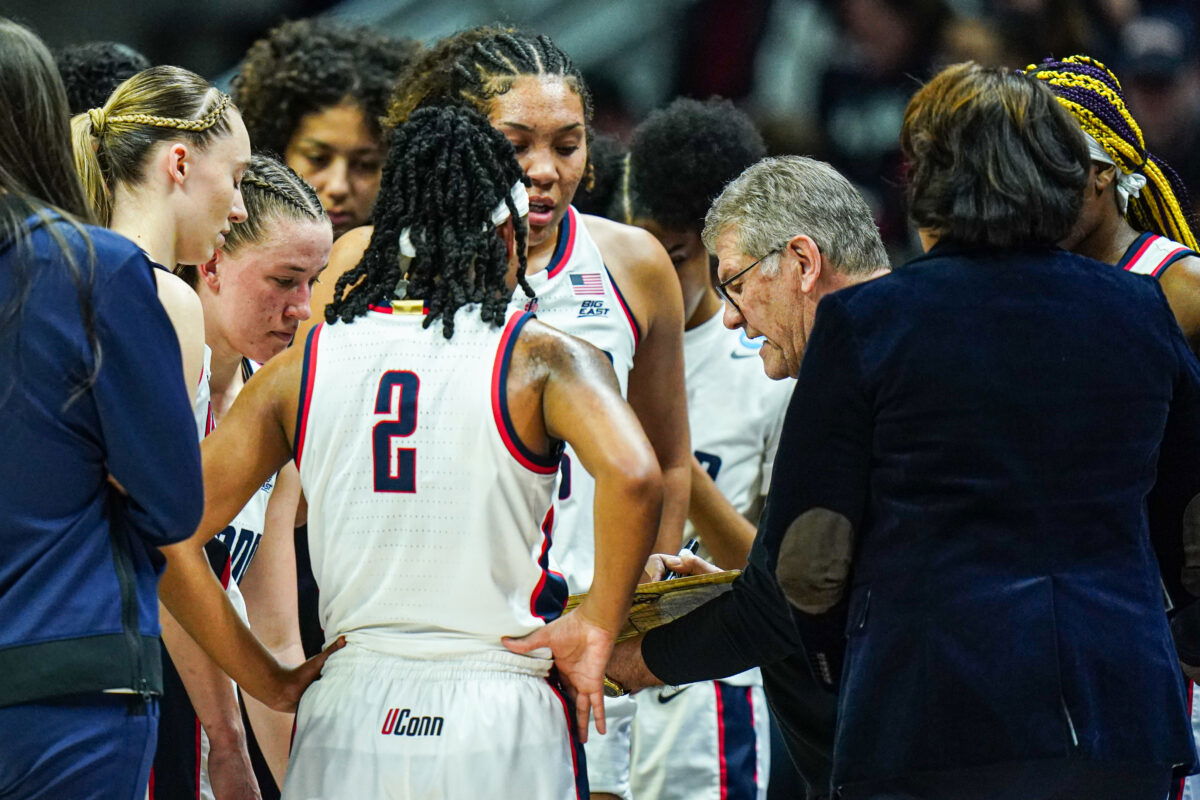
USA Today via Reuters
Mar 25, 2024; Storrs, Connecticut, USA; UConn Huskies head coach Geno Auriemma talks to his players from the sideline as they take on the Syracuse Orange at Harry A. Gampel Pavilion. Mandatory Credit: David Butler II-USA TODAY Sports

USA Today via Reuters
Mar 25, 2024; Storrs, Connecticut, USA; UConn Huskies head coach Geno Auriemma talks to his players from the sideline as they take on the Syracuse Orange at Harry A. Gampel Pavilion. Mandatory Credit: David Butler II-USA TODAY Sports
It would not be wrong to say that Geno Auriemma is the most decorated coach in college basketball history. With the most wins in NCAA history and the best winning percentage for coaches with a minimum of 10 seasons, Auriemma also has the most titles, with 12. Many WNBA legends have learned the tricks of the trade from him, including the likes of Sue Bird, Diana Taurasi, and Rebecca Lobo. Hopefully, in a few years, we will also be talking about Paige Bueckers in the same breath.
Watch What’s Trending Now!
Serving as UConn’s head coach since 1985, Geno Auriemma has built the program from the ground up. His success and coaching philosophy could easily translate to the WNBA, where many coaches, especially newcomers, can benefit from his example. First-time head coaches like Natalie Nakase of the Golden State Valkyries and Tyler Marsh of the Chicago Sky would do well to draw inspiration from seasoned leaders like Auriemma, who has been at the helm for decades. And it’s not just those two. This year’s WNBA coaching pool includes three former college head coaches (Karl Smesko, Lynne Roberts, and Teresa Weatherspoon), three WNBA assistants stepping into new roles (Chris Koclanes, Sydney Johnson, and Tyler Marsh), and one international coach, Rachid Meziane.
ADVERTISEMENT
Geno Auriemma: The Perfectionist
Auriemma hasn’t become the coach he is without nitpicking his players and demanding the best from them. From the precision of their footwork to the sharpness of their mental focus. He is unapologetically demanding, a perfectionist in the purest sense, who holds his athletes to a standard that often exceeds even their own understanding of their capabilities. For Auriemma, great is never good enough. He believes that greatness is not achieved by accident but through relentless, uncomfortable repetition of the right habits.
He said in his MasterClass, “My players would describe my leadership style as, he’s a perfectionist. He bitches about every little thing. The minute it’s done a hair wrong, he’s all over it. And, if I do something eight times in a row and get it wrong the ninth time, all he remembers is the ninth time I did it wrong. But he wants me to be great. And I know that everything he does is meant to help me be better.”
Top Stories
Dana White Shares Update On Hospitalized Paddy Pimblett After UFC 324

Bills Officially Cut Ties With 4 Players as Josh Allen Remain Without HC After Philip Rivers Quits

Paddy Pimblett Suspended From Competition After UFC 324 Bout Against Justin Gaethje

Cooper Kupp’s Wife Fires Back at Rams for ‘Disrespecting’ Him After Reported Retirement Push Before Seahawks Move

Strahan Family in Mourning as Michael Strahan’s Cancer-Free Daughter Grieves Close Friend’s Loss After Cancer Battle

Max Scherzer’s “Unfinished Business” Sends Clear Signal to Blue Jays After Honest Plea to All 30 MLB Teams

The small details are everything to Auriemma. Newer coaches might believe that, given their inexperience, it’s smarter to build friendships with players and take a more relaxed, approachable style instead of being a hard-nosed disciplinarian like Auriemma. But that strategy does have its merits, and Auriemma’s track record speaks for itself. The younger players coming into the WNBA are overwhelmed, and if the coaches keep this intensity in training, it will eventually be easier for them to perform on the court. ”
ADVERTISEMENT
Focusing on the process rather than the Titles
Everyone is chasing the coveted trophy. Everyone wants their name etched into the history books. Once upon a time, Geno Auriemma was no different. He loved winning, and he eventually reached heights few others ever have. But over time, he came to realize that the pursuit of success was changing him, and not in ways he liked. The constant pressure to win, the obsession with results, and the emotional toll it took began to shift his perspective.
ADVERTISEMENT
He said in an interview last year, “I’m the guy that’s going to make them better and every day was like. We’re going to figure this out together, la la la la la and as the years went on and we started winning and all that, I became an angry coach. I lost the joy of coaching, and I lost the connection to the players. I did. I got caught up in having to prove myself rather than just the joy of helping them learn.”
Many franchises and coaches tend to get consumed by the chase for championships. While winning titles is undoubtedly the ultimate goal, it’s important they don’t lose sight of the deeper purpose behind what they’re doing. When the process is overlooked, the results rarely follow. The true spirit of sports lies not only in the trophies but also in the joy and fulfillment players experience on the court.
ADVERTISEMENT
A Championship team requires a Championship Staff
It seems obvious on the face, but it is something that is overlooked by coaches and franchises alike. Hiring an assistant coach and the support staff is one of the most important things a coach can do, and Auriemma has something that could help many of the WNBA teams and coaches.
He said, “So now, rule number one, find someone who knows more than you do and has skills that you don’t have. And now the two of you form the first team you’re going to have. That’s your first big recruit. And you better get that one right. If you don’t get anything else right, you better get that one right.”
One of the biggest lessons from here is to understand what you are an expert about and be humble enough to accept that you don’t know some of the things, and for that, your support staff should be equipped to fill in. The coaches and the management should keep their egos aside and let people who know their stuff do their thing and not micromanage everyone.
ADVERTISEMENT
Recruit players who Fit Your Team
Statistics, spreadsheets, and numbers alone don’t define the perfect player. While metrics are certainly part of the equation, Geno Auriemma emphasizes something deeper: the intangibles, the identity, and the character of each athlete. He doesn’t just want players who produce results; he watches how they respond to failure, how they carry themselves in adversity, and how they interact with teammates.
To Auriemma, a true UConn player is instantly recognizable not just by her talent or passing ability, but by her selflessness, composure, and the way she uplifts those around her. His program carries a distinct identity, one that reflects his values and expectations. Everyone knows what a Geno team looks like. It is a culture rooted in discipline, unity, and pride.
ADVERTISEMENT
He has said, “How do I know that? I watch how they treat their teammates. Well, you don’t watch how many points they score? Who cares? I watch what happens when a coach takes them out, what happens when a ref makes a bad call, what happens when they throw a pass and it bounces off their teammate’s head — the look of disgust at their teammates.”
A player might have the best stats on paper, but poor behavior on the court can be toxic. It spreads through the team like a virus. Suddenly, no one is performing at their best, and instead of focusing on basketball, the team is dealing with ego clashes, internal issues, and distractions. For Auriemma, character is not just important. It is the foundation.
While there are many more of his teachings that could be helpful, these are the more important ones. Over the years, he has had so much success that everything now seems just a drop in the ocean for him, but he still continues at his job with the same rigor because he wants to shape the young lives that thrive under him.
ADVERTISEMENT
ADVERTISEMENT
ADVERTISEMENT
ADVERTISEMENT